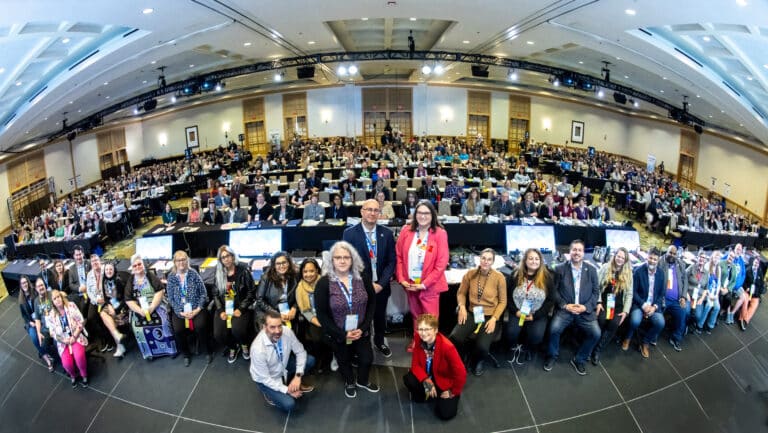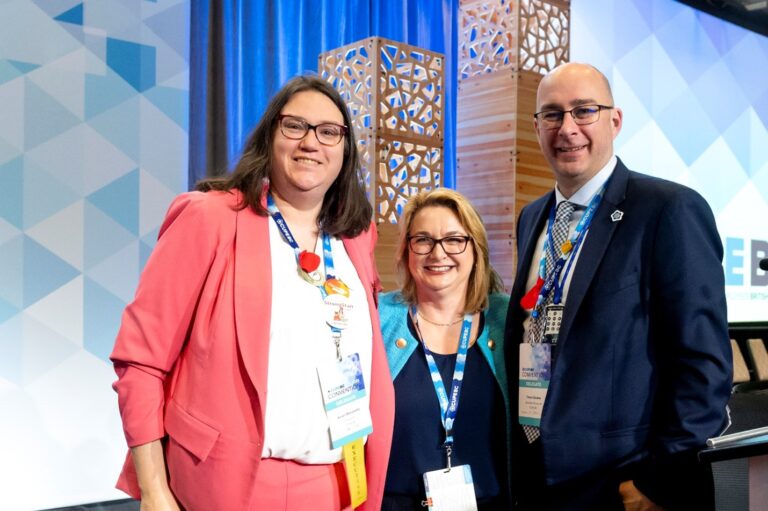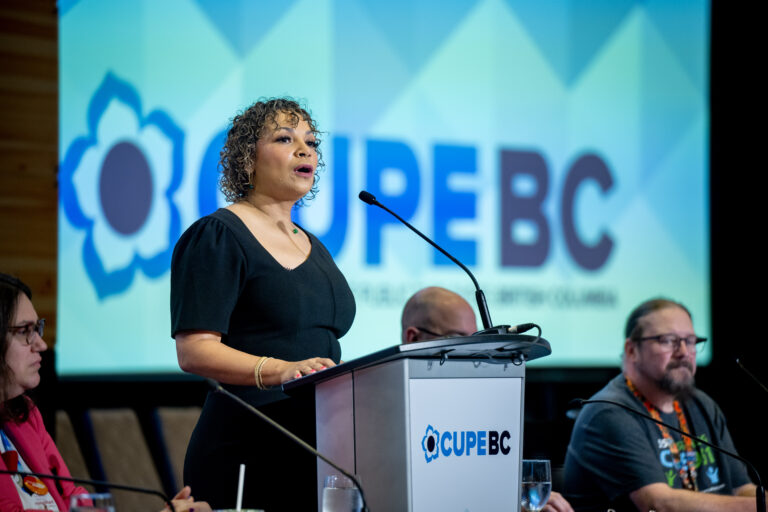Mayor urged to stop waffling on community centre’s future
PENTICTON—With the arrival of hot summer weather beckoning local residents outdoors, Wednesday night’s town hall meeting on the future of the municipality’s community centre drew a crowd of 150—sending a clear message about the importance of public recreation services to South Okanagan residents.
Mayor Dan Ashton heard that message loud and clear, with invited guest speakers and several audience members urging him to come clean on whether the centre and its services will be privatized when it reopens next year.
The centre was closed in March for a $23 million upgrade, leading to the layoff of 36 employees. The fact that the City refused to extend CUPE member seniority rights beyond one year—approximately when the centre is due to reopen—has been regarded by many as a sign that the City intends to privatize the operation.
The CUPE-sponsored meeting, held at the Penticton Seniors’ Drop-In Centre, began with remarks from a guest panel comprised of CUPE BC president Barry O’Neill, CUPE Research representative Blair Redlin and local community activist Tina Martin.
O’Neill’s comments focused on the “first class” recreation services that the 36 laid-off employees provided as dedicated residents of Penticton.
“The kind of service they provided was not for a big pay cheque so they could move to Vancouver,” he said.
Don’t get fooled again
Revisiting the theme of his 2008-09 provincial tour, “Investing in Our Communities,” O’Neill warned local politicians not to succumb to the hollow promise of public-private partnerships—as they had already done with the costly and controversial South Okanagan Events Centre (SOEC).
“I get angry,” he said, “when I hear people talk about ‘our future’ and ‘the debt we’ll be leaving our children’ while in the same breath deciding to take a core service and sign a 30-year agreement so that a young person will have no input—from the time he starts work to the time he retires—on the issue of local infrastructure.”
Martin, an independent community activist, recalled the petition campaign she led in the spring that called on the City not to employ a private company to run the new facility and to maintain the same high quality staff, service and programs. In April, she delivered 1,600 signatures to the mayor’s office.
Noting that she has no personal ties with staff and is not affiliated with CUPE, Martin said she would like to believe that the petition will make a difference.
“If I had one message it would be ‘keep the staff.’ As a parent, it’s so important to feel safe with those that work with my children. I trust these people with my children.”
Redlin reminded the audience of some of the P3 failures well beyond the SOEC, including the Cranbrook RecPlex, where privatization led to high cost overruns and a 7-per-cent tax increase, and others in Edmonton, Ottawa, Guelph and Moncton.
“The City’s refusal to confirm that it will not privatize the centre is causing worry that this is precisely what’s planned,” he said.
Time to get off the fence
Redlin drew loud applause when he refuted a remark by Mayor Ashton, quoted in yesterday’s edition of the Penticton Western News, that the City could not comment on the centre’s future because it was part of a collective bargaining issue.
“It has nothing to do with collective bargaining,” said Redlin. “It is a public policy decision that the City needs to be up front about with the citizens of Penticton.”
Both Ashton and councilor Garry Litke, who were thanked for attending the meeting along with councilors Judy Sentes and John Vassilaki, nonetheless came under fire for refusing to confirm whether the community centre will be privatized.
Ashton, seen taking notes throughout the meeting, sought the public’s patience—and Martin’s in particular—while council considers all the issues. At one point, he read an e-mail from his Blackberry to illustrate his willingness to sit down with CUPE 608 president Patti Finch.
Litke, in response to demands for a decision right there at the meeting, defended the mayor’s strategy.
“I’m a great believer in seniority rights and an opponent of contracting out, but what we’re here to talk about is who is talking to whom?” said the councilor.
“The solution [for the centre] will occur at a table where the City and representatives of CUPE come to an agreement. If it’s changes that need to be made to seniority and contracting out, if that’s the problem, then the City is prepared to sit down with union representatives to resolve these issues.”
Finch, responding to Litke’s comment that the union had not yet signaled its willingness to meet, countered that the CUPE local had already approached council about a meeting.
“And I say to you again, if there’s any desire at the City to talk about this, then bring it on,” she said, renewing the union’s call to sit down for discussions on the centre’s future.
Putting the ‘community’ back in ‘community centre’
Also during the question and answer session, an elderly woman who identified herself as a volunteer at the community centre before its closure said that she would not volunteer at a privately run community centre. And several audience members raised concern about the level of training and qualification of privatized staff.
A man nearing retirement after 27 years working for the City said that contracting out aquatic and lifeguard staff would lead to a loss of innovation, well-trained staff and affordable recreation for the public. One of the 36 laid off employees, a 43-year-old lifeguard who had begun working for the City when she was 18, said that she recently dropped off an application at a Lower Mainland municipality—and was chased into the parking lot to be hired on the spot.
“How are we going to be able to trust, and who will be accountable, if our community centre is privatized?” asked CUPE 523 president and temporary CUPE staff representative Zoe Magnus.





